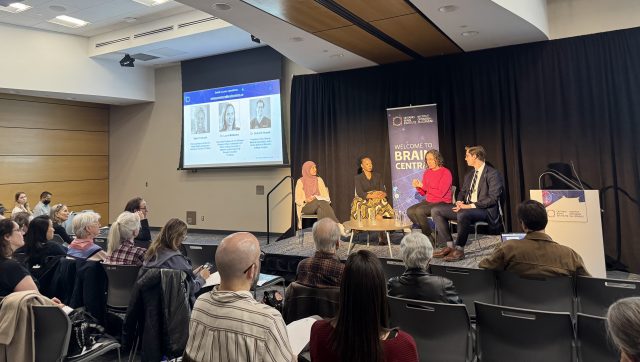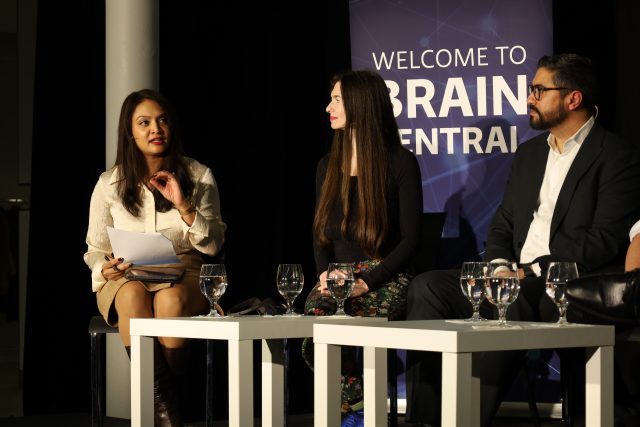Our minds function optimally when we eat in a nutritious and balanced way. For instance, our brain makes up just 2% of our body weight but consumes 20% of our energy use, which means we spend about three hundred calories a day just thinking! But research has shown that interplay between our bodies and the food we eat can lead to changes in health, and that diet does not drive everything.
In November 2021, Ontario Brain Institute (OBI) hosted a Public Talk entitled “Your Brain on Food” as part of the Wellness Series. At the event, four panelists explored links between what we put in our mouths and what we get out of our minds, both in the short-term and across the lifespan. They also unpacked connections between gut and brain health, recommended specific foods for boosting brain power, and discussed how food can be medicine.
The panel, moderated by scientist and author Dr. Dan Riskin, included several research experts:
- Dr. Elizabeth Donner, Director of the Comprehensive Epilepsy Program at the Hospital for Sick Children and Professor and Michael Bahen Chair in Epilepsy Research at the University of Toronto,
- Dr. Jane Foster, Professor in the Department of Psychiatry and Behavioural Neurosciences at McMaster University,
- Dr. Heather Keller, Schlegel Research Chair in Nutrition & Aging at the Schlegel-UW Research Institute for Aging and the University of Waterloo, and
- Dr. Edward A. Ruiz-Narváez, Associate Professor of Nutritional Sciences at the University of Michigan School of Public Health.
Dr. Donner’s work looks at how children with epilepsy can be treated through food, specifically by following a ketogenic regime – a restricted diet high in fat and low in carbohydrates. She said that there is evidence to suggest that when the body does not have its first fuel in sugar or carbs, it burns fat and produces ketones. She noted that research shows that ketones may have antiseizure properties, as people impacted with epilepsy have shown to have fewer seizures when in ketosis (or keto), with the body primarily burning fat as fuel.
Dr. Donner pointed out, however, that a medically prescribed keto diet restricts an individual’s intake of not just grain-based food, such as bread, rice, and pasta, but also many fruits and vegetables. She urged attendees to consult a dietician before looking to start a keto regime in order to ensure that they get all the micronutrients they need via supplements or food.
Dr. Foster explained that there are trillions of bacteria in the body’s intestinal track that influence both the gut and the brain. As an expert in this type of bacteria, scientifically known as gut microbiomes, she said that there is also an intrinsic connection between digestive function, metabolism, and brain health – notably mental health. She also stated that our bodies take the best out of our diets, so that restricted regimes such as keto, could actually detrimental if followed by a healthy person in the long term.
Dr. Foster suggested that that the differences in each person’s microbiocidal make-up – how many we have and how healthy our gut bacteria may be – dictate how individual digestive systems process food and release nutrients back into our bodies. She also said that the most important pathway between gut microbes and the body is the immune system, which is heavily linked to the brain, underscoring the notion that that we may, in fact, be what we eat.
Dr. Keller focused on the dietary needs of aging populations, saying that people’s dietary needs change as we get older, not just in terms of lower calorie count, but also in the level of nutrients that we need. She recommended that as we age, in order to support good cognitive function, we should consume more protein, noting that the exact amount of plant- or animal-based proteins required are based on each person’s body weight. She also suggested that as we age, we should increase our intake of vitamin D and calcium because the body’s ability to absorb these important nutrients begins to decline. She reminded viewers that nutritional supplements can be beneficial, but that people should look to nourish and sustain themselves with food first.
Dr. Ruiz-Narváez described how in his work, he examines the role of genetics in differences of what people need to eat to lead healthy lives. For example, he noted that the ways in which our bodies process carbohydrates point to how we respond to stressful situations, as metabolism is regulated by insulin – the body’s main anabolic hormone – in the same manner as it does the immune system, which manages stress. He emphasized how it is important to look at the intersection of stress, diet, and the immune system in order to understand how the body reacts to what it is fed. In some cases, he noted, a digestive system treats new foods as “strange invasions,” which is similar to how the mind might handle new situations.
The panelists also discussed nutritional nuances between plant-based and animal-based proteins, the meaning of various foods to different cultures, and the importance of enjoying meals with friends and family.
“Food is a lot more complex than we think,” stated Dr. Keller. “But it’s simple. Eat whole foods, eat with others. Think about food beyond nutrients, think to quality of life, family life and culture – all of these have an impact on the health of our brains.”
To enjoy the full discussion, watch the video on YouTube.



